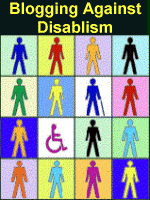Sister Edith, Professor of Sociology at the College of St Scholastica in Duluth who blogs at Monastic Musings didn't miss it. I did. Here's what she had to say about it:
Can a Person with a Disability Hear a Call to Religious Life?
[A post for Blogging Against Disablism Day]In the Church, we hear often about the shortage of vocations to religious life and the priesthood. Most dioceses and many parishes hold prayer vigils, Come-and-See programs, urge parents, teachers, religious ed leaders - everyone - to speak positively and openly to young people about religious vocations. Because of the shortage, people in middle age (like me) and older are accepted into religious life - I know one Benedictine who was 72 the day she made her perpetual monastic profession.
Most vocation pamphlets, though, listing the characteristics they seek in a candidate, include "good health" while a few refer to the rugged nature of the work of the community. The tacit meaning is that people with a disability that might require adaptations, limit the type of work they can do, or require special care should not apply.
Do religious orders shun the disabled? No - if a monk or nun becomes disabled, communities work very hard to continue to include them in their communal and prayer life, and find ways to enable them to participate and contribute. But - very few offer an open door to people with a disability. The Benedictines of Jesus Crucified, whose only U.S. monastery is in Branford, Connecticut, is the only one I know about.
Does it make sense to have only one, or a very small number of religious orders open to people with a disability? A century ago, when there was less awareness of adapting work environments, when religious life involved unimaginable feats of manual labor, when formation programs were applied like a cookie cutter to each postulant, like the army, no one thought about whether a person with a disability might have a vocation.Beginnings: Paris , France, 1930. In a number of young women coming to him for spiritual direction, Father Maurice Gaucheron, a priest on the staff of the Basilica of Montmartre in Paris recognized a call to the monastic life that, for reasons of insufficient health, remained unfulfilled. Fragile health necessarily excluded these young women from existing monasteries. Father Gaucheron believed that monastic life could and should be open to young women such as these. In illness and physical frailty he saw a means of following Jesus into the mystery of his Pasch.
 I wonder, though, how that can continue to be true in the 21st century. With less rigorous manual labor, many roles in communities performed on computers, and much greater availability of adaptive technologies, it seems as though that barrier should be falling. Maybe it is, and I simply haven't heard about it.
I wonder, though, how that can continue to be true in the 21st century. With less rigorous manual labor, many roles in communities performed on computers, and much greater availability of adaptive technologies, it seems as though that barrier should be falling. Maybe it is, and I simply haven't heard about it.
Among those I have seen enter religious life, though, there have not been any people who were blind, profoundly deaf, or unable to walk. There are always concerns, I'm sure, about assuming responsibility for medical bills - some communities are so stretched financially that elderly sisters have to use Medicaid - but should that prevent them from considering an applicant whose stable work record is evidence of her ability to contribute?
I hope that communities can, at the very least, stop putting the automatic "no" in their literature and on their web sites, and begin the conversation with applicants whom Christ might very well be sending to them. This may be a long way off, but it's worth praying for.
No comments:
Post a Comment